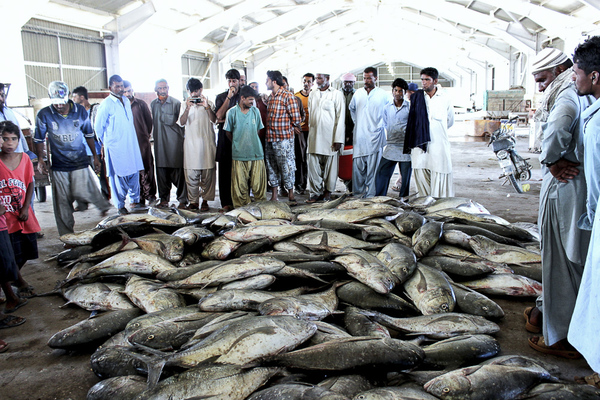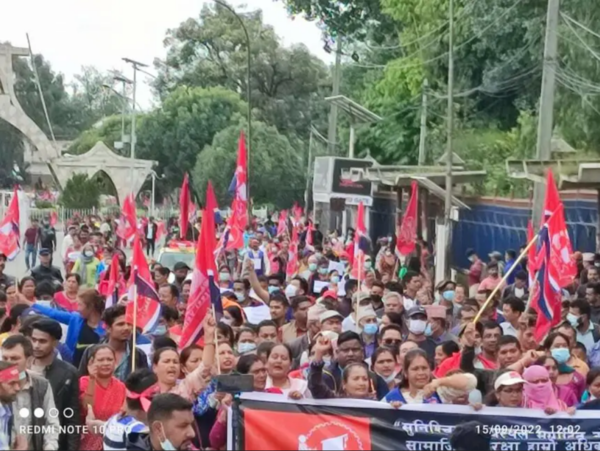Nepal fruit and vegetables street market, Creative Commons
Editorial
A street vendor is, by definition, someone who sells goods or services from a temporary structure or a mobile stall, and not from a permanent place or structure. Street vendors need access to a space where they can set up their stall, and they prefer spaces where many people pass by, such as busy streets or junctions. But it is becoming increasingly difficult for street vendors to access such spaces, as municipal governments promote gentrification and urban development projects that do not take their needs into consideration. Street vending is being criminalised, putting vendors at increasing risk of having their carts, stall and goods confiscated by local authorities.
In the city of Kathmandu, Nepal, a new mayor came to power in May 2022, and immediately launched several violent crackdowns on street vendors, forcing them to abandon their spaces and leading to their goods being destroyed or seized. Then, in January 2023, the municipal government issued a notice strictly prohibiting street vending on roads and footpaths, as well as the use of carts or bicycles to sell vegetables, fruits and any other items. According to the Nepal Street Vendors Trade Union (NEST), there are over 15,000 vendors in the Kathmandu district and around 30,000 in the three districts of the Kathmandu Valley who depend on their work to feed their families. Human rights activists, urban planners, members of the NEST and others have criticised the city's actions
Kathmandu is not alone. More and more big cities across Asia are taking actions that criminalise street vendors and undermine their abilities to make a living. In India, for instance, street vendor organisations may have been successful in getting a national law passed to protect their rights (Protection of Livelihood and Regulation of Street Vending Act of 2014) but, nearly a decade later, it has yet to be enacted and evictions of hawkers that should have been deemed illegal under this act continue in cities across India.
Bangkok, like other large cities, has enacted vending laws requiring food stalls and carts to operate only in designated areas assigned by the authorities. In an effort to clean up the city, the Thai government charges vendors rent for these designated spaces. However, this approach comes at a steep cost to street vendors, and will inevitably limit the options available to their customers, including low-wage workers and urban poor who rely on affordable street food for their daily sustenance.
Street vendors are not just a common sight in Asian cities, they are essential to the local economy and food systems. It is imperative for governments to recognize their significant contribution and protect them from unfair treatment. Failure to support street vendors would not only harm their livelihoods but also negatively impact the economy as a whole.
Across the region
Gwadar port development leaves fisherfolks’ lives in shambles
 Fisherfolk at Gwadar fish market, Zofeen T Ibrahim/China Dialogue
Fisherfolk at Gwadar fish market, Zofeen T Ibrahim/China DialogueGwadar is a coastal city in Balochistan, Pakistan, that is an important fishing hub. It has four major fishing harbours - Pishukan, Gwadar, Pasni and Ormara, where about 80 % of the coastal population is engaged in fisheries-related activities. But these communities are now under threat from the China Pakistan Economic Corridor (CPEC), a major bilateral project that was signed in 2015 and which includes the construction of a deep-water port in Gwadar that will be connected by rail and road to China’s Xinjiang region.
The fisherfolk in Gwadar fear that they will be displaced by the port construction and other developments that are part of the CPEC project, despite assurances from the government that their lives will be improved. Indeed, the Gwadar Master Plan, passed in 2020, makes no provision for fisherfolk villages or fish markets and is based on an earlier master plan developed by China's city of Shenzhen, which led to the destruction of its fishing villages. The Gwadar fisherfolk also remember that in 2007, during an initial round of construction at the port, hundreds of fishing families were relocated to housing schemes that turned out to be too far from the shore and without access to public services like schools and hospitals.
There are signs that fisherfolk will face a similar fate this time around. Under the CPEC project, Chinese companies will control and develop the port and an adjacent Special Economic Zone, as well as other connected infrastructure. In 2016, they began conctruction of the special economic zone and are currently in the process of constructing a massive expressway to connect the East Bay (Deymi Zirr) of the port, an important local fishing area, to the Makran Coastal Highway. The plan for the expressway would have blocked the access for fisherfolk to the sea were it not for their protests, which forced the government to change the expressway construction to include underpasses to enable boats to pass. But this has hardly allayed the fears of the fisherfolk. They worry that their access to the East Bay will be closed permanently soon after construction at the port is completed. Already, they are facing difficulties in accessing the East Bay because of security checks and permission requirements brought in to protect foreign investors.
And physical displacement is not the only concern for Gwadar's fisherfolk. The CPEC project has also brought an influx of Chinese deep sea trawlers to the area that is undermining their livelihoods. “We are totally against these fishing trawlers. They will wipe out the entire fish stock and destroy our community,” said Saeed Baloch of Pakistan Fisherfolk Forum (PFF). The local fisherfolk and the Gwadar coastal communities simply cannot compete with these big mechanised trawlers. Already the presence of Chinese trawlers has forced more than a dozen fish processing facilities to shut their operations.
As more and more small businesses are shuttered, more and more big firms are coming in. One example is the Optima Integration Group of China, which signed an agreement with Asia Pak Investments of Pakistan to invest US$50 million to set up an export seafood processing plant in Gwadar's industrial zone.
The fisherfolk and other locals in Gwadar understand that the CPEC project will lead to the demise of their communities, and they feel compelled to resist these developments as they have no other alternatives. Over the past few years, they have organised numerous protests and recently, in August 2021, they came together to form the Gwadar Rights Movement under the leadership of religious scholar Maulana Hidayat ur Rehman Baloch. One of their first actions, in mid-2021, was to block roads to the airport and the port to pressure authorities to put an end to Chinese deep-sea trawling and to reduce the number of security checks.
Article by GRAIN
Based on conversation with Pakistan Fisherfolk Forum
Street vendors in Kathmandu are mobilizing in mass to protest for access to public space and their right to work

Street vendors protest in Kathmandu; NEST
The Nepal Street Vendors’ Unions (NEST) mobilized its members in Kathmandu for a mass protest on 9 January 2023 against mayor Balendra Shah's "clean up" operations, which has involved mass evictions and harassment of the city's 34,000 street vendors.
Discriminatory urban policies against the working poor
In May 2022, a new mayor, Balendra Shah, was elected to rule the Metropolitan City of Kathmandu. He made his first priority to “clean the city” of garbage, but that is not all: he also instructed the Metropolitan Police to clear all areas from the presence of street vendors, which resulted in a daily experience of violence to the street vendors. In Kathmandu, street vendors have been banned from their usual places of business and unable to work for months. This has resulted in loss of incomes and livelihoods.
The international organization Human Rights Watch has documented the assault on the rights of the urban poor taking place in Kathmandu, which are threatening up to 34,000 vendors in the city, many of whom are women who have no other source of income or employment.
Mass mobilization to secure workers’ rights
In response, NEST and the General Federation of Nepalese Trade Unions (GEFONT) organized a public protest in September last year. After the demonstration in September, the leaders presented a memorandum to the Mayor and said that if nothing was done to ensure the right to work of street vendors in public spaces, more protests would follow.
The situation hasn’t changed since. NEST was organising a rally of vendors in the streets of Kathmandu on 9 January to demand that authorities respect people’s right to work freely and to occupy public spaces as citizens.
“One of the various pressure strategies we put in place to protect the rights and interests of the street vendors is organizing a strong, public demonstration”, says Maya Gurung, leader of NEST and member of StreetNet International Council. “In Nepal, many protests have been planned thanks to NEST for two decades, but the state has never been serious about the creation of policies and laws in favour of street vendors.”
NEST and StreetNet international are urging all workers’ organizations and coalitions defending the right to work and the right to the city to stand in solidarity with street vendors in Kathmandu and amplify their struggle and demands.
There can be nothing for us without us!
Adapted from article by Irene Doda, StreetNet International
From the news
Ali Abunimah, The Electronic Intifada
Carrefour is facing mounting criticism over its profiteering from illegal colonies built on occupied Palestinian land. Last year, Carrefour announced its entry into the Israeli market through a relationship with local supermarket chain Yenot Bitan and other Israeli firms operating extensively in Israel’s colonies in the occupied West Bank. “This partnership will see the Carrefour banners set in Israel before year end 2022 and will allow all Yenot Bitan stores, more than 150 to date, to have access to Carrefour-branded products before the summer,” Carrefour stated in March.
A recent report published by a coalition of organizations, including France’s CGT labour federation and the Palestinian human rights group Al-Haq, explained how Carrefour's expansion into Israel will directly profit from the illegal colonisation of occupied Palestinian territory.
Bangkok Post
Big C, the supermarket and convenience store chain owned by Thai billionaire Charoen Sirivadhanabhakdi, has picked Bank of America and UBS Group to advise it on an initial public offering expected to be worth at least 30 billion baht.
Founded in 1993, Big C was taken private in 2017 when acquired by Berli Jucker, the company controlled by Sirivadhanabhakdi, who has a net worth of US$16.5 billion.
Business & Human Rights Resource Centre
A Spanish court has ruled that Amazon broke labour laws by forcing more than 2,000 delivery drivers to use an app that the company controlled for scheduling work and payments and requiring them to use their own cars and cellphones on the job.
The court decision is the latest in a series of legal measures in Spain that are designed to stop e-commerce and delivery app companies from designating workers as self-employed when they have little control over their hours and earnings. Spain’s socialist coalition government in 2021 passed the “Riders Law,” which classified food delivery riders as employees of the digital platforms they work for.
Tong Van, Inside Retail
Tencent Holdings’ social app WeChat has been reported to be testing on-demand takeout delivery service in China, aiming to capture shares in the US$55.4 billion food delivery market. Research company, IMarc Group estimates the China online food delivery market reached $66.4 billion last year and will generate $129.6 billion by 2028.